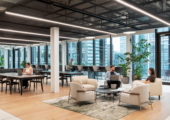March 3, 2022
Bereaved employees feel added pressure of job insecurity
 Empathy, a platform helping families navigate the journey they face after losing a loved one, today released the first edition of its annual Cost of Dying Report (registration). The report reveals results from a new survey exploring the real cost of dying in the US and the impact on bereaved employees. The report includes a foreword from Goldman Sachs, as well as reflections from experts in the end-of-life space including David Kessler, Chief Empathy Officer at Empathy & Grief Expert, BJ Miller, MD, Compassion Advisor at Empathy & Co-Founder of Mettle Health, and Shoshanna Ungerleider, MD, Founder of the End Well Foundation. (more…)
Empathy, a platform helping families navigate the journey they face after losing a loved one, today released the first edition of its annual Cost of Dying Report (registration). The report reveals results from a new survey exploring the real cost of dying in the US and the impact on bereaved employees. The report includes a foreword from Goldman Sachs, as well as reflections from experts in the end-of-life space including David Kessler, Chief Empathy Officer at Empathy & Grief Expert, BJ Miller, MD, Compassion Advisor at Empathy & Co-Founder of Mettle Health, and Shoshanna Ungerleider, MD, Founder of the End Well Foundation. (more…)



















 A majority of Americans feel newly empowered in the new era of work, according to a new survey from Randstad USA. Nearly three-in-four (73 percent) respondents feel as though they can make changes to their work-life balance, and 79 percent reported gaining new clarity regarding their professional goals, higher than the global average of 72 percent.
A majority of Americans feel newly empowered in the new era of work, according to a new survey from Randstad USA. Nearly three-in-four (73 percent) respondents feel as though they can make changes to their work-life balance, and 79 percent reported gaining new clarity regarding their professional goals, higher than the global average of 72 percent. 
 More than a third (37 percent) of legal professionals have considered leaving their role due to poor mental health and wellbeing, according to the latest research from
More than a third (37 percent) of legal professionals have considered leaving their role due to poor mental health and wellbeing, according to the latest research from 


 Recruitment firm PageGroup has releases a study which claims to shine a light on the wide range of perceived barriers facing disabled individuals in the world of work. The findings reveal how far UK businesses still have to go to level the playing field for disabled candidates. According to Parliamentary Briefing Papers on Disability Equality in the Workplace,
Recruitment firm PageGroup has releases a study which claims to shine a light on the wide range of perceived barriers facing disabled individuals in the world of work. The findings reveal how far UK businesses still have to go to level the playing field for disabled candidates. According to Parliamentary Briefing Papers on Disability Equality in the Workplace, 








January 11, 2022
Great Resignation offers firms a chance to create the Great Retention
by Erin Eatough • Comment, Flexible working, Wellbeing, Working culture